|
This section contains 5,711 words (approx. 20 pages at 300 words per page) |

|
SOURCE: Musser, Judith. “African American Women and Education: Marita Bonner's Response to the ‘Talented Tenth.’” Studies in Short Fiction 34, no. 1 (winter 1997): 73-85.
In the following essay, Musser appraises Marita Bonner's short fiction as a unique collection of work that reflects the struggle of African American women attempting to answer the Harlem Renaissance's challenge for self-improvement via education while living outside the sanctuary of Harlem and struggling with issues of economic hardship, discrimination, and cultural alienation.
Alain Locke's call for the “New Negro” and W. E. B. Du Bois's classification of “the Talented Tenth” created a myriad of creative interpretations during the Harlem Renaissance, especially by women writers. Marita Bonner's work responds to the need for an examination of the lives of characters who must cope with economic hardships, discrimination, deterioration of family relationships, illnesses that are particular to urban life, new religious communities, and multi-ethnic neighborhoods within urban...
|
This section contains 5,711 words (approx. 20 pages at 300 words per page) |

|


